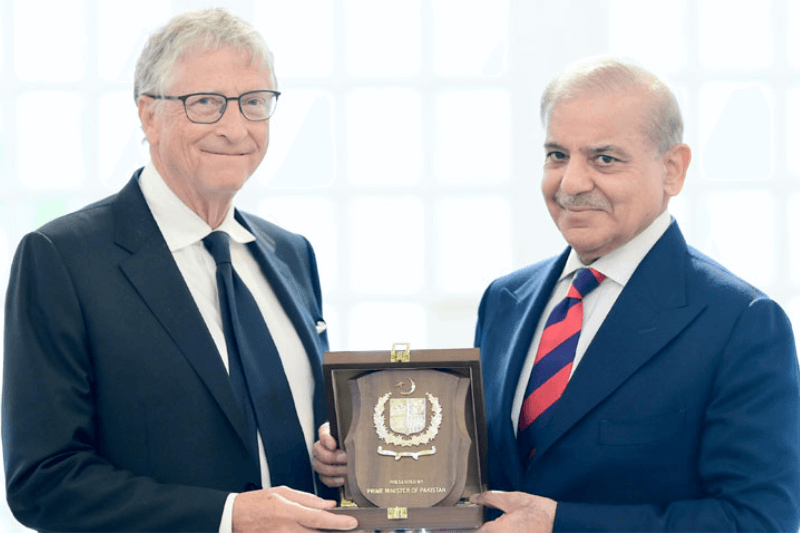
bill-gates-and-pakistan-pm-shehbaz-sharif-unite-for-health-financial-inclusion-and-climate-adaptation
Strengthening Partnerships for a Better Future
Co- chair of the Bill & Melinda Gates Foundation and philanthropist Bill Gates met with Pakistan Prime Minister Shehbaz Sharif, Deputy Prime Minister Ishaq Dar, federal and provincial Ministers and Chief of Army Staff General Asim Munir. The discussions focused on improving the lives of vulnerable people- particularly women and girls and upgrading shared goals in health, nutrition, climate adaptation, technology and financial inclusion.
A Shared Commitment to Polio Eradication
Prime Minister Shehbaz Sharif stated that “ Pakistan remains steadfast in its commitment to ending polio. Any case where a child is paralyzed by polio is one too many.” The PM also underscored the urgent need to stay committed and devoted to a world free of polio, emphasizing on Pakistan’s dedication to ensuring productive and healthy lives for its people. This partnership with the Gates Foundation is important in accomplishing these goals. “We will leave no stone unturned to eliminate polio,” he asserted.
Engaging with Health Sector Leaders and Innovators
Bill Gates also engaged with NGOs working in the health sector and female Frontline workers in polio and routine vaccination programs to learn from their experiences. A brief discussion on climate adaptation, attended by the Prime Minister Sharif and hosted by Romina Khurshid Alam, witnessed Gates engage with leaders and innovators. This was followed by a visit to the National Emergency Control Room of the National Disaster Management Authority.
“ I am inspired by Pakistan’s continued commitment to improving health, gender equity and financial inclusion for vulnerable populations,” Gates said. He appreciated the hard work and dedication of every individual involved in improving health for all, from female frontline workers to government leaders. Gates expressed confidence that with continued collaboration and innovative approaches, Pakistan would make remarkable progress toward ending polio.
Focusing on Data Science and Digital Technology
The meetings highlighted the use of data science and digital technology to improve the lives of Pakistanis, particularly women. Discussions with government leaders, NGOs and private sector partners underscored initiatives like the RAAST payment system, which provides Pakistani women with direct access to capital, enhancing their ability to participate in the formal economy and access vital services.
Addressing Wild Poliovirus and Future Health Emergencies
High on the agenda were efforts to drive progress against wild poliovirus and respond to the recent surge in detections. Pakistan is one of two remaining countries where the wild virus continues to spread. Pakistan has reported five cases of wild poliovirus till now for this year. Chair of Rotary’s National PolioPlus Committee, Aziz Memon, underscored the commitment of healthcare workers, community mobilizers and Rotary members in overcoming challenges to end polio.
Strengthening Health and Nutrition for Women and Children
Gates learned about efforts by local NGOs to strengthen health and nutrition in Pakistan, especially among children and women, to elevate overall health and reduce preventable deaths. Discussions with senior health officials also showcased Pakistan’s efforts to amplify the routine vaccination system and improve the primary health care system.
Promoting Financial Inclusion
A financial services roundtable highlighted ongoing commitments to reinforce women’s income generating capacities and develop an inclusive financial ecosystem, including the rollout of an interoperable payment system. The discussion included participation from major government leaders and financial services partners, emphasizing the importance of financial inclusion of economic development.



